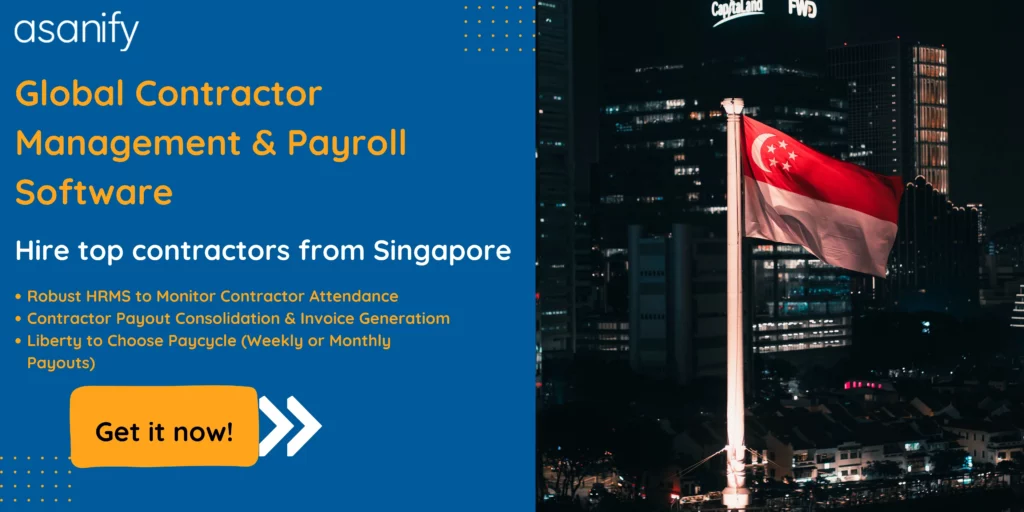Are you a business owner looking to hire and find out ways to pay contractors in Singapore? Do you want to understand the process of hiring and managing contractors, as well as the legalities involved in paying them? Look no further! In this comprehensive guide, we will walk you through everything you need to know about hiring and paying contractors in Singapore.
Contents
- Who is an Independent Contractor in Singapore?
- How is an independent contractor in Singapore different from an Employee?
- Penalties for Contractor and Employee misclassification in Singapore
- What are the Labor Laws in Singapore?
- Steps to Hire a Contractor in Singapore
- Important Considerations for Hiring and Managing Contractors in Singapore
- How to draw up an independent contractor agreement in Singapore
- Do’s and Don’ts of Designing an Independent Contractor Agreement to Hire and Pay Contractors in Singapore
- How Payroll Works When You Move Ahead to Pay Contractors in Singapore
- Tax Filing Requirements for Contractors in Singapore
- Tax Compliance for US Companies
- Minimum Wages for Contractors in Singapore
- Best Ways to Pay Contractors in Singapore
- Currency and Other Considerations to Pay Contractors in Singapore
- Tax and Other Payroll Costs for Contractors in Singapore
- Termination or extension terms for independent contractors in Singapore
- Quick Wrap Up
- Frequently Asked Questions
Who is an Independent Contractor in Singapore?
Before diving deep into the intricacies of hiring and paying contractors, let’s first define who exactly falls into this category. In Singapore, an independent contractor is an individual who is engaged by a company or business to provide specific services on a contractual basis. Unlike employees, contractors work independently and are not entitled to employee benefits and protection under employment laws.
Now, let’s explore the world of independent contractors in Singapore in more detail.
Salient Features of Independent Contractors in Singapore
- Independent contractors can come from various professional backgrounds, such as IT consultants, graphic designers, writers, photographers, and many more. They offer their expertise and services to businesses on a project basis, allowing companies to tap into specialized skills without the need for long-term employment commitments.
- When engaging an independent contractor, it is crucial for both parties to establish a clear and comprehensive contract that outlines the scope of work, deliverables, timelines, and payment terms. This contractual agreement helps to protect the interests of both the contractor and the company, ensuring that expectations are aligned and disputes can be resolved amicably.
- One of the key advantages of hiring independent contractors in Singapore is the flexibility it offers to businesses. Companies can engage contractors for short-term projects, seasonal work, or to fill in skill gaps within their existing workforce. This flexibility allows businesses to adapt quickly to changing market demands and scale their operations without the burden of hiring and training permanent employees.
Distinction and Categorization
It is important to note that the distinction between an independent contractor and an employee is not always clear-cut. The Singapore Ministry of Manpower provides guidelines to determine the employment status of individuals, taking into consideration factors such as control over work, ownership of tools and equipment, and the degree of financial risk undertaken by the individual.
From a tax perspective, independent contractors in Singapore are responsible for their own tax obligations. They are required to register for Goods and Services Tax (GST) if their annual turnover exceeds the GST registration threshold. Additionally, contractors must keep proper records of their income and expenses to fulfill their tax reporting requirements.
As independent contractors are not entitled to employee benefits, they are responsible for their own healthcare coverage, retirement planning, and insurance. It is essential for contractors to consider these aspects and make appropriate arrangements to safeguard their financial well-being.
In conclusion, independent contractors play a vital role in Singapore’s business landscape, offering specialized skills and flexibility to companies across various industries. Understanding the definition and intricacies of engaging independent contractors is crucial for businesses to navigate the legal and financial aspects of such arrangements successfully.
Also Read: Independent Contractor Agreement
How is an Independent Contractor in Singapore Different from an Employee?
It’s crucial to understand the distinction between an independent contractor and an employee in Singapore. While both may perform work for a company, there are significant differences in their legal status, employment terms, and obligations. Contractors have more freedom and flexibility in terms of their working hours, work location, and the ability to take on multiple clients or projects simultaneously.
Legal Status
When it comes to legal status, independent contractors are considered self-employed individuals who run their own businesses. They are not considered employees of the company they work for. This means that contractors are responsible for their own taxes, insurance, and other business-related expenses. On the other hand, employees are hired by a company and are subject to the company’s policies, benefits, and tax withholding.
Employment Status
In terms of employment terms, independent contractors typically work on a project basis or for a specific period of time. They are usually engaged for a particular task or assignment and are not entitled to the same benefits and protections as employees. Contractors are often paid based on the completion of the project or on an agreed-upon rate, while employees receive a regular salary or hourly wage.
Autonomy
Independent contractors have more control over their work. They have the freedom to choose when and where they work, as long as they meet the agreed-upon deadlines and deliverables. This flexibility allows contractors to manage their own schedules and take on multiple clients or projects simultaneously, which can be financially rewarding.
Benefits
It’s crucial to note that independent contractors do not enjoy the same level of job security as employees. They do not have the same legal protections and may not be entitled to benefits such as paid leave, medical insurance, or retirement plans. Contractors also bear the risk of not being able to find new projects or clients once their current assignment is completed.
On the other hand, employees have a more stable employment relationship with the company. They are entitled to benefits and protections under the Employment Act, such as paid leave, medical benefits, and statutory contributions to the Central Provident Fund (CPF). Employees also have the right to file complaints or seek redress for unfair treatment or wrongful termination.
In conclusion, while both independent contractors and employees contribute to the workforce in Singapore, they have distinct differences in their legal status, employment terms, and obligations. Contractors enjoy more freedom and flexibility in their work arrangements, but they also bear more responsibility for their own taxes and expenses. Employees, on the other hand, have more job security and are entitled to various benefits and protections under the law.
Suggested Read: EOR India- A Detailed Guide on Employer of Record
Penalties for Contractor and Employee Misclassification in Singapore
Properly classifying your workers as either independent contractors or employees is vital for compliance with Singapore laws. Misclassifying workers can result in severe penalties, including fines and legal consequences. It’s crucial to ensure you understand the criteria for differentiating between contractors and employees to avoid misclassification and potential legal issues.
When it comes to contractor and employee misclassification in Singapore, the consequences can be far-reaching. Not only can misclassification lead to financial penalties, but it can also damage your company’s reputation and erode trust among your workforce. Therefore, it is essential to delve deeper into the topic to fully grasp the implications.
Imposition of Hefty Fines
One of the primary penalties for misclassifying workers in Singapore is the imposition of hefty fines. The Ministry of Manpower (MOM) has the authority to impose fines ranging from SGD 5,000 to SGD 20,000 per misclassified worker. These fines can quickly add up, especially if multiple workers are misclassified within your organization.
Legal Consequences
Misclassification can also result in legal consequences. The affected workers may file claims against your company, seeking compensation for employment benefits they were denied due to being wrongly classified as contractors. These claims can include demands for back pay, overtime wages, and even statutory benefits such as paid leave and medical benefits.
Moreover, the legal consequences can extend beyond individual claims. If the Ministry of Manpower determines that your company has engaged in widespread misclassification, it may initiate legal action against your organization. This can lead to protracted legal battles, which not only drain your financial resources but also divert your attention from core business activities.
It is worth noting that the criteria for differentiating between contractors and employees in Singapore are not always straightforward. The MOM considers various factors, such as the degree of control exercised over the worker, the nature of the work performed, and the level of independence the worker has in carrying out their tasks. Understanding these criteria and applying them accurately can be challenging, especially for businesses operating in complex industries.
Therefore, to avoid misclassification and its associated penalties, it is advisable to seek professional advice from legal experts or human resource consultants well-versed in Singapore’s employment laws. These professionals can help you navigate the intricacies of worker classification, ensuring compliance and minimizing the risk of misclassification.
In conclusion, misclassifying workers as independent contractors or employees in Singapore can have severe consequences. From financial penalties to legal action and reputational damage, the implications of misclassification are significant. To safeguard your organization, it is crucial to understand the criteria for differentiation and seek expert guidance when necessary. By doing so, you can ensure compliance with Singapore’s employment laws and maintain a harmonious relationship with your workforce.
Also Read: Employee Misclassification Guide- The Key to Avoiding Penalties
What are the Labor Laws in Singapore?
In Singapore, the Employment Act reigns supreme; acting as the foundation for labor law here. However, there are some other employment-related laws functioning here too. These include:
Apart from staying acquainted with the various provisions of the labor law, make sure that you don’t stay in the dark concerning Singapore’s Central Provident Fund or CPF. As the name goes, it is a pension scheme for workers in Singapore. Both employers and employees need to compulsorily contribute to this fund.
While there are no statutory rights for independent contractors in Singapore, you need to extend these rights to them in case you plan to convert them into full-time employees. The benefits enjoyed by an employee in Singapore are governed by the Employment Act. These include the following:
- Paid sick leave;
- Maternity Leave;
- Childcare Leave;
- Paid public holidays;
- Overtime pay
The benefits that you choose to offer the contractors will depend upon the terms and conditions mentioned in the independent contract agreement. This is because there is no such norm to offer statutory benefits to freelancers or contractors.
Asanify can help you navigate through the often-bewildering journey of decoding the labor law provisions in Singapore. Click here to hire and pay contractors in Singapore compliantly.
Recommended Read: Pay Contractors in Philippines
Steps to Hire a Contractor in Singapore
Now that we have established what independent contractors are and the consequences of misclassification, let’s delve into the steps you need to follow to hire a contractor in Singapore. The process involves several key considerations, such as determining your project requirements, sourcing potential contractors, evaluating their suitability, and negotiating a contract that protects both parties’ interests.
Step 1: Determine Your Project Requirements
Before you start looking for a contractor, it is crucial to have a clear understanding of your project requirements. Take the time to define the scope of work, timeline, and budget for your project. This will help you communicate your expectations effectively and ensure that you find a contractor who can meet your specific needs.
Step 2: Source Potential Contractors
Once you have a clear idea of your project requirements, it’s time to start sourcing potential contractors. There are several ways you can do this. You can ask for recommendations from friends, family, or colleagues who have recently completed similar projects. You can also search online directories, forums, or social media groups to find contractors who specialize in your type of project.
Step 3: Evaluate Suitability
After you have compiled a list of potential contractors, it’s important to evaluate their suitability for your project. Start by checking their credentials, such as licenses, certifications, and insurance coverage. Look for contractors who have experience in handling projects similar to yours and ask for references from their previous clients. This will give you an idea of their work quality and reliability.
Step 4: Conduct Interviews
Once you have narrowed down your list of potential contractors, it’s time to conduct interviews. Schedule face-to-face or virtual meetings with each contractor to discuss your project in detail. During the interviews, ask questions about their approach to the project, their availability, and their communication style. This will help you assess their professionalism and compatibility with your working style.
Step 5: Review and Negotiate Contracts
After you have selected a contractor who meets your requirements, it’s essential to review and negotiate the contract. The contract should clearly outline the scope of work, project timeline, payment terms, and any other relevant details. It’s important to ensure that the contract protects both parties’ interests and includes provisions for dispute resolution and termination.
Step 6: Monitor the Project
Once the contract is signed, it’s crucial to actively monitor the progress of the project. Regularly communicate with the contractor to stay updated on the project’s status and address any concerns or issues that may arise. This will help ensure that the project stays on track and meets your expectations.
By following these steps, you can hire a contractor in Singapore with confidence, knowing that you have taken the necessary precautions to find a reliable and competent professional. Remember, thorough planning and careful evaluation are key to a successful contractor hiring process.
Suggested Read: How to Pay Contractors in Your Business?
Important Considerations For Hiring and Managing Contractors in Singapore
When hiring and managing contractors in Singapore, you need to be aware of various important considerations. These include understanding the contractual relationship, establishing clear expectations, managing the contractor’s performance, ensuring compliance with labor laws, protecting intellectual property rights, and mitigating potential risks.
Comprehending the Contractual Relationship
Understanding the contractual relationship is crucial when engaging contractors in Singapore. It is important to clearly define the terms and conditions of the contract, including the scope of work, deliverables, payment terms, and termination clauses. This ensures that both parties have a clear understanding of their rights and obligations, minimizing the risk of disputes and misunderstandings.
Setting Clear Expectations
Establishing clear expectations is essential for a successful contractor-client relationship. Clearly communicate your project requirements, deadlines, and quality standards to the contractor. This helps in aligning their work with your expectations and ensures that the project progresses smoothly. Regular communication and feedback are also important to keep track of the contractor’s progress and address any issues that may arise.
Managing the Performance of the Contractor
Managing the contractor’s performance is crucial to ensure that the project is completed on time and to the desired quality. Regularly monitor their progress, review their work, and provide constructive feedback. This helps in identifying any performance gaps early on and allows for timely corrective actions. It is also important to recognize and appreciate good performance to motivate the contractor and maintain a positive working relationship.
Staying Compliant
Ensuring compliance with labor laws is a critical consideration when hiring contractors in Singapore. Familiarize yourself with the relevant labor regulations and ensure that the contractor is aware of their rights and obligations. This includes ensuring that the contractor has the necessary work permits and licenses, providing a safe working environment, and adhering to fair employment practices.
Intellectual Property Rights Protection
Protecting intellectual property rights is another important aspect of managing contractors in Singapore. Ensure that your contract includes provisions to safeguard your intellectual property, such as confidentiality and non-disclosure clauses. It is also advisable to have the contractor sign an intellectual property assignment agreement, transferring ownership of any intellectual property created during the project to your company.
Mitigating potential risks is crucial when engaging contractors in Singapore. Conduct due diligence before hiring contractors, including checking their reputation, credentials, and track record. It is also important to have appropriate insurance coverage to protect against any potential liabilities that may arise during the project. Additionally, consider including indemnification clauses in the contract to allocate risks and responsibilities between the parties involved.
In conclusion, hiring and managing contractors in Singapore requires careful consideration of various factors. By understanding the contractual relationship, establishing clear expectations, managing performance, ensuring compliance with labor laws, protecting intellectual property rights, and mitigating potential risks, you can foster a successful and productive relationship with your contractors.
Also, check out: Foreign Independent Contractors- Guide to Best Practices
How to Draw Up an Independent Contractor Agreement in Singapore
An independent contractor agreement is a crucial legal document that outlines the terms and conditions of the engagement between your company and the contractor. This agreement helps protect both parties by clearly defining the scope of work, payment terms, confidentiality clauses, termination provisions, and other essential details. It’s important to consult with a legal professional to draft a comprehensive and enforceable contract.
Do’s and Don’ts of Designing an Independent Contractor Agreement to Hire and Pay Contractors in Singapore
Do’s
1. Clearly Define Scope of Work
Outline the specific tasks and responsibilities the independent contractor is expected to perform.
2. Specify Payment Terms
Clearly state the payment structure, whether it’s a fixed fee, hourly rate, or milestone-based payments, along with the schedule.
3. Establish Timeline
Define project milestones and deadlines to ensure clarity on the expected duration of the contract.
4. Include Confidentiality Clauses
Protect sensitive information by incorporating confidentiality clauses to prevent the contractor from disclosing proprietary information.
5. Ownership of Work
Clearly state who will own the intellectual property rights of the work produced during the contract.
6. Termination Clause
Include conditions under which either party can terminate the contract, along with notice periods and any associated penalties.
7. Compliance with Laws
Ensure that the agreement and the work to be performed comply with Singaporean labor laws and regulations.
8. Insurance and Liability
Specify whether the contractor is required to carry liability insurance and outline the extent of their liability.
9. Dispute Resolution
Include a provision for dispute resolution, whether through arbitration, mediation, or another agreed-upon method.
Don’ts
1. Ambiguous Language
Avoid vague or ambiguous terms; be specific in describing the scope of work, payment terms, and other crucial details.
2. Ignoring Local Laws
Neglecting Singapore’s labor laws can lead to legal issues; ensure your agreement aligns with local regulations.
3. Excessive Control
Be cautious about exerting too much control over the contractor, as this might jeopardize their independent contractor status under Singaporean law.
4. Omitting Payment Details
Failing to clearly outline payment terms can lead to misunderstandings and disputes.
5. Neglecting Termination Terms
Leaving out clear termination clauses may lead to confusion and legal complications if the need to terminate the contract arises.
6. Overlooking Confidentiality
Ignoring confidentiality clauses can expose your business to risks related to the disclosure of sensitive information.
7. Skipping Insurance Details
Neglecting to address insurance and liability matters may result in disputes over responsibility in case of accidents or damages.
8. Ignoring Intellectual Property
Failing to establish ownership of intellectual property can lead to disputes over the use and rights to the work produced.
9. Relying on Verbal Agreements
Avoid relying solely on verbal agreements; always document terms in writing to prevent misunderstandings.
How Payroll Works When You Move Ahead to Pay Contractors in Singapore
One of the key considerations when hiring contractors is understanding how payroll works. Unlike employees who receive a regular salary, contractors are typically paid based on an agreed-upon rate or project milestone. It’s essential to establish a clear payment schedule and track the contractor’s invoices and expenses to ensure accurate and timely payments.
You may like to check out: Invoice for Contractors- The Guide to Making an Ideal One!
Tax Filing Requirements for Contractors in Singapore
Contractors in Singapore are responsible for fulfilling their tax obligations. They need to register for and file their taxes with the Inland Revenue Authority of Singapore (IRAS). The tax filing requirements for contractors may differ from those of employees, so it’s crucial for contractors to understand their tax responsibilities and keep proper records of their income and expenses for tax purposes.
The progressive tax rate of up to 24% (as updated in 2023) is applicable to independent contractors who are citizens or residents of Singapore. For contractors, who are functioning as a business entity, need to pay a corporate tax rate of 17%.
The norm in Singapore is that only citizens or permanent residents of the land can work as self-employed contractors or freelancers legally. Therefore, it is mandatory for all contractors to contribute to the Central Provident Fund or CPF.
Tax Compliance for US Companies
If your company is based out of the US, you have to take care of both the Singaporean requirements, as well as, the provisions established by the IRS. Make sure that all your foreign contractors are filling out the W-8 BEN form, that you will be providing them with. The purpose behind making your foreign contractors fill up W-8 BEN form is to collect their tax information and other crucial employment-related facts.
Did the burden of completing all the legal paperwork on time swamp you with stress? If yes, cheer up because Asanify’s tools of International Hiring and Global Contractor Management will take care of these vital aspects without you having to lose your sleep. Tax compliance is now quick and simple!
Minimum Wages to Pay Contractors in Singapore
Unlike some countries, Singapore does not have a legislated minimum wage. Instead, wages for contractors are typically negotiated between the hiring company and the contractor. It’s essential to establish fair and competitive compensation rates that align with the market while taking into account the contractor’s skills, experience, and scope of work.
Best Ways to Pay Contractors in Singapore
When it comes to paying contractors in Singapore, there are several payment methods to consider. These include bank transfers, checks, and electronic payment platforms. It’s important to choose a payment method that is convenient for both parties and ensures secure and efficient transactions. Let’s have a look at the various hassle-free methods to pay contractors in Singapore:
1. Bank Transfers: To Pay Contractors in Singapore
- Description: Electronic transfer of funds directly from the employer’s bank account to the contractor’s bank account.
- Advantages: Secure, traceable, and widely accepted.
- Considerations: Ensure accurate bank details are provided to avoid payment delays.
2. Cheques: To Pay Contractors in Singapore
- Description: A written order instructing a bank to pay a specific amount to the contractor.
- Advantages: Physical record of payment, suitable for those who prefer traditional methods.
- Considerations: Longer processing time compared to electronic transfers; be mindful of potential delays.
3. GIRO (General Interbank Recurring Order): To Pay Contractors in Singapore
- Description: A direct debit arrangement where payments are automatically deducted from the employer’s bank account and transferred to the contractor.
- Advantages: Convenient for recurring payments.
- Considerations: Requires authorization and setup through banks.
4. PayNow: To Pay Contractors in Singapore
- Description: A peer-to-peer funds transfer service available in Singapore that uses the recipient’s mobile number, NRIC, or business registration number.
- Advantages: Instant transfers and easy to use.
- Considerations: Both the payer and payee need to be registered for PayNow.
5. Cash: To Pay Contractors in Singapore
- Description: Physical currency handed over directly to the contractor.
- Advantages: Immediate payment.
- Considerations: Not always practical or advisable for larger transactions; lacks a formal record.
6. Digital Wallets: To Pay Contractors in Singapore
- Description: Payment through mobile apps or digital wallets like GrabPay, PayLah!, or Google Pay.
- Advantages: Quick and convenient for smaller transactions.
- Considerations: Ensure the contractor is willing to accept payments through the chosen digital wallet.
7. Credit/Debit Cards: To Pay Contractors in Singapore
- Description: Payments made using credit or debit cards.
- Advantages: Convenient, and may offer benefits like cashback or rewards.
- Considerations: Contractors need to have the necessary infrastructure to accept card payments.
8. Cryptocurrency: To Pay Contractors in Singapore
- Description: Payment made using cryptocurrencies like Bitcoin or Ethereum.
- Advantages: Decentralized, potential for faster international transactions.
- Considerations: Both parties must agree to use cryptocurrencies; consider volatility and regulatory aspects.
9. Electronic Payment Platforms: To Pay Contractors in Singapore
- Description: Services like PayPal or Stripe for online payments.
- Advantages: Widely used for online transactions, especially for international contractors.
- Considerations: Transaction fees may apply; ensure the contractor is comfortable with the platform.
Are you pondering as to what is the easiest way to pay contractors in Singapore? Well, by availing
When selecting a payment mode, it’s essential to consider factors such as security, convenience, and the preferences of both parties. Additionally, ensure that the chosen method complies with legal and regulatory requirements in Singapore. Document the agreed-upon payment mode clearly in the contractor agreement to avoid misunderstandings.
Currency and Other Considerations to Pay Contractors in Singapore
If you are operating a foreign business in Singapore or paying contractors located outside the country, you may need to consider currency exchange rates and other financial considerations. It’s advisable to consult with financial experts to understand the best practices for international payments and to minimize any potential currency-related risks.
Tax and Other Payroll Costs for Contractors in Singapore
In addition to their tax obligations, contractors in Singapore may be subject to other payroll costs, such as Central Provident Fund (CPF) contributions, which provide social security and retirement benefits. Understanding these additional costs is crucial when determining the total compensation package for contractors and ensuring compliance with relevant regulations.
Termination or Extension Terms for Independent Contractors in Singapore
Termination or extension of the contractor’s engagement is an important aspect to consider. The terms regarding termination and extension should be clearly outlined in the independent contractor agreement. Having a mutual understanding of the conditions for contract termination or extension helps avoid disputes and protect the interests of both parties.
Suggested Read: Terminating a Contractor- Know How to End an Agreement Politely
Quick Wrap-Up: Pay Contractors in Singapore
By now, you should have gained a comprehensive understanding of how to hire and pay contractors in Singapore. From determining the classification of workers to understanding legal obligations, managing contracts, and ensuring proper payments, each step is crucial for a successful contractor engagement. Remember to consult legal and financial professionals to ensure compliance and minimize any potential risks!
Frequently Asked Questions: Pay Contractors in Singapore
To provide further clarity, let’s address some commonly asked questions regarding hiring and paying contractors in Singapore:
Q: Can contractors work for multiple companies simultaneously?
A: Yes, contractors have the flexibility to work with multiple companies or clients simultaneously. However, you should establish clear expectations regarding any conflicts of interest or confidentiality obligations.
Q: Are there any restrictions on hiring foreign contractors in Singapore?
A: Hiring foreign contractors may require additional considerations, such as work permits or visas. It’s important to adhere to the regulations set by the Ministry of Manpower (MOM) to avoid any legal issues.
Q: How can I ensure that a contractor is qualified for the job?
A: Before hiring a contractor, you should thoroughly assess their qualifications, experience, and expertise. Requesting references, reviewing their portfolio or past work, and conducting interviews can help you determine their suitability for the role.
Q: What should I do if a contractor fails to deliver the agreed-upon work?
A: It’s essential to address performance issues promptly. If a contractor fails to deliver the agreed-upon work, you should refer to the terms stated in the independent contractor agreement and try to resolve the issue through open communication. In severe cases, termination may be necessary.
We hope this comprehensive guide has equipped you with the necessary knowledge and understanding of how to hire and pay contractors in Singapore. Remember to consult with professionals, such as legal advisors and financial experts, to ensure compliance with Singapore laws and navigate the complexities of contractor engagements successfully.
Not to be considered as tax, legal, financial or HR advice. Regulations change over time so please consult a lawyer, accountant or Labour Law expert for specific guidance.










![Read more about the article [60+] Awesome employee engagement activities for startups](https://media.asanify.com/wp-content/uploads/2021/07/26150127/picxy_DD228481-300x200.jpg)
![Read more about the article Contractor Agreement Template in India [Free Download]](https://media.asanify.com/wp-content/uploads/2024/08/06150853/Best-Results--300x150.webp)